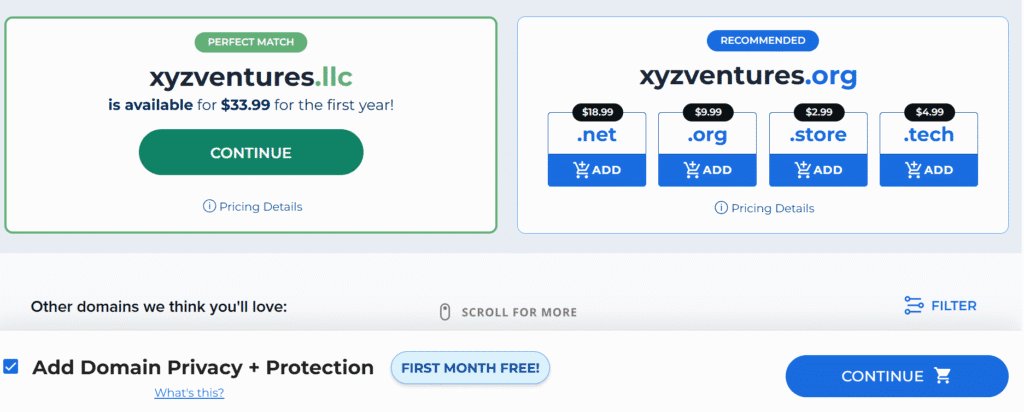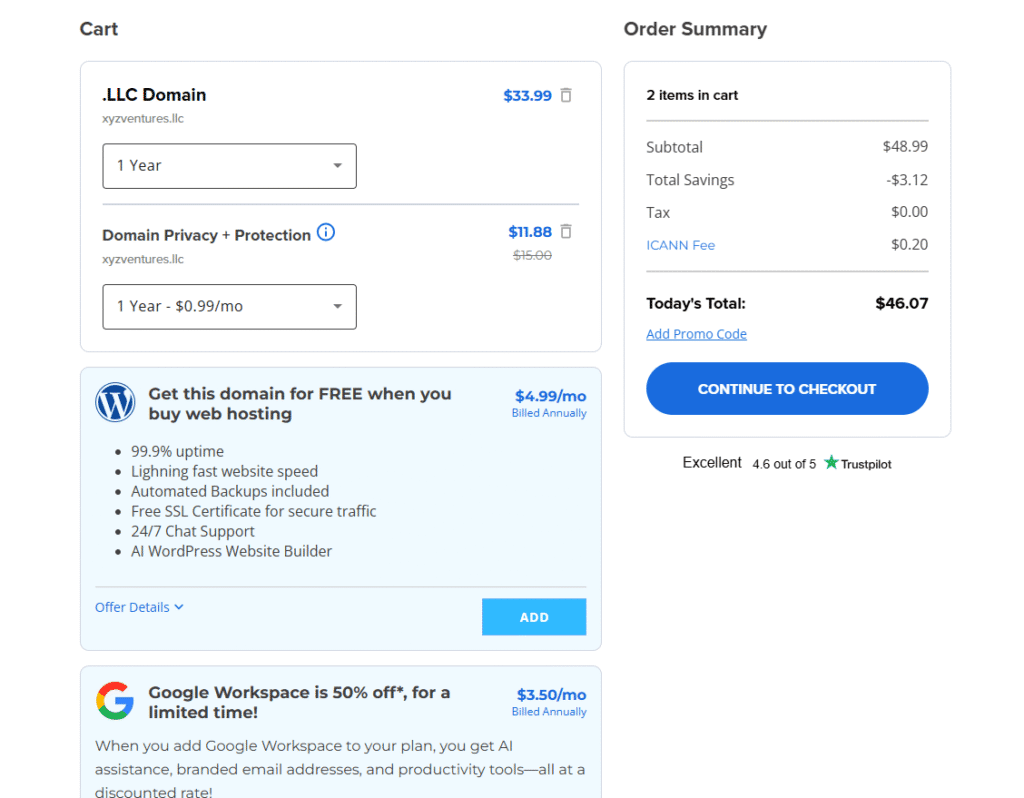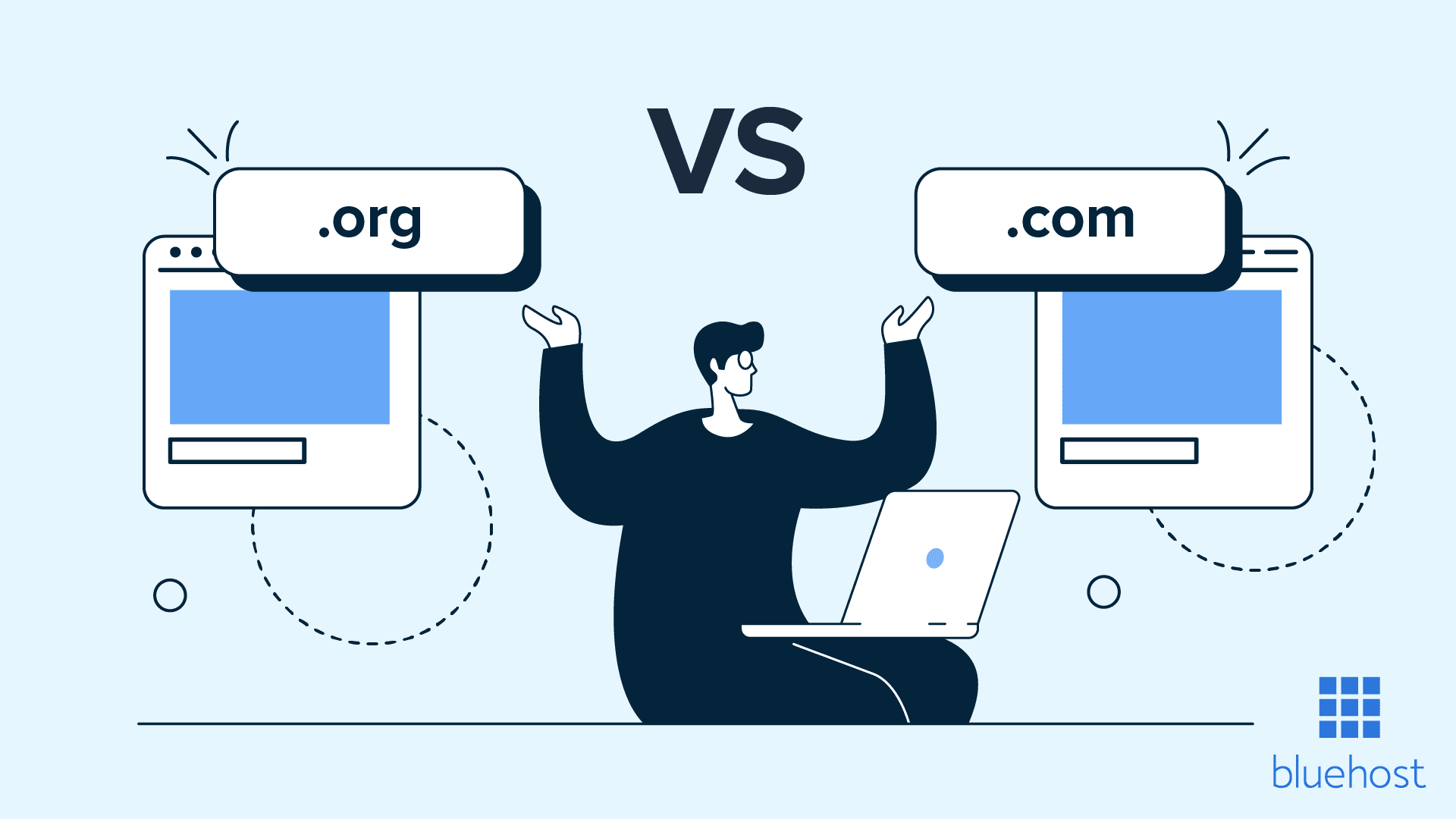Key highlights
- Know how a .llc domain signals your LLC status and boosts trust with customers and partners.
- Learn when .llc beats .com or .org for brand fit and when another TLD makes more sense.
- Understand benefits and limits including name availability, brand protection, awareness and relevance to non LLCs.
- Explore step by step purchase and setup with Bluehost providing as well as supporting privacy, SSL, DNSSEC and professional email.
- Uncover brand safety tips like registering .com and .llc together and using redirects to capture traffic.
Tailored specifically for limited liability companies (LLC), .llc domains serve as a generic top-level domain that aligns seamlessly with the legal identity of an LLC. This provides a direct indication of your business structure in your URL.
In previous articles, we covered similar topics such as, Should I buy a .us domain? and Should I buy a .org domain extension? It’s recommended to read these two articles before making a final decision.
In this article, we’ll dive into the benefits and potential drawbacks of a .llc domain to help you make an informed decision.
History of the .llc domain extension
The .llc domain was introduced to provide a clear and specific online identity for businesses that are legally registered as LLCs. The .llc TLD allows these businesses to communicate their structure to potential customers and business partners immediately through their domain names.
It’s a popular choice among entrepreneurs and established businesses. By choosing a .llc domain, you’ll not only reinforce your legitimacy but also enhance your brand’s visibility among a sea of generic top-level domains.
What are the key benefits of a .llc domain name?
Limited liability companies benefit from the .llc domain extension because it directly reflects your business’s legal structure. That’s the core .llc domain meaning, instant clarity about who you are.
If you’re weighing .llc vs .com, remember: .com is universal, but a .llc domain name is laser-specific to your entity type.
Take a look at these benefits and how they can improve your online identity:
- Clear business identity: A .llc domain immediately identifies your site as being owned by a legally recognized LLC. This enhances trust and credibility among customers and partners.
- Brand protection: Registering a .llc domain helps protect your brand identity and prevents others from claiming it. This is how you can maintain your business’ integrity online.
- Availability: As a newer and less saturated option, .llc domains offer more chances to register short, relevant, brandable names that might be taken in other TLDs like .com or .net.
- Professional email alignment: Pair your site with email like [you]@[yourbrand].[llc] for consistent branding across channels. It looks polished and clearly ties to your LLC.
- Exact-match naming: If your legal name is “XYZ Ventures LLC,” an exact .llc domain name (e.g., [xyzeventures].[llc]) keeps your public identity aligned with filings and invoices.
- Niche positioning: .com is broad; .llc domains signal structure and accountability—useful for services where trust matters (law, finance, consulting, real estate, healthcare).
- Multi-domain strategy: Use .llc for your corporate site and keep .com for marketing or product pages. Forward one to the other to capture both audiences and protect the brand.
Quick take on .llc vs .com: Choose .com for maximum familiarity and default expectation; choose .llc when legal clarity, trust signaling and name availability are your top priorities. In many cases, owning both (.com + .llc domains) is the safest play.
Get Started! Search and buy your domain today!
What are the cons of a .llc domain?
There are several considerations to keep in mind with a .llc domain extension:
- Relevance to business structure: If your business is not an LLC, using a .llc TLD could be misleading and might deter potential clients who wish to seek clarity in business dealings.
- Limited awareness: As a relatively new TLD, .llc does not have the universal recognition or prestige of older TLDs like .com or .org, which might affect user perception.
- Market limitation: The .llc domain is highly specific and may not be suitable for individuals, non-profits or businesses that do not operate as LLCs. This can potentially limit the .llc domain’s usefulness.
You should carefully weigh these factors, taking into account your specific needs and the potential impact on your online presence.
Should I buy .llc domain name?
If your business is a limited liability company (LLC), investing in a .llc domain can strengthen your brand identity online. The .llc domain meaning is simple, it clearly identifies your company as an LLC, helping you stand out as a legitimate business entity.
Whether you’re a fresh startup or a well-established enterprise, a .llc domain today is well suitable for emphasizing your structure and professionalism.
When it comes to .llc vs .com, both have distinct advantages. The .com domain remains the most widely recognized and trusted option across the web, ideal for general commerce and global audiences.
However, since many .com names are already taken, .llc domains provide a targeted alternative that highlights your business type. They’re especially useful for firms wanting to promote their legal structure while maintaining a clean, modern brand presence.
Managed by the Internet Corporation for Assigned Names and Numbers (ICANN), .llc domains are part of the expanding range of internet corporation domain options designed for niche branding.
While domain prices for .llc extensions may vary slightly compared to traditional TLDs, the clarity and trust they offer can make them a worthwhile investment.
In conclusion, if you operate an LLC and want your domain to reflect your company’s identity, build credibility and stay easy to remember, a .llc domain is a great choice.
But if your business is not an LLC or if you prioritize global reach and recognition, a .com domain may better suit your goals.
How to buy a .llc domain name?
Purchasing a .llc domain name extension is pretty straightforward with Bluehost:
- Go to our domain name search tool. You’ll need to ensure domain availability before proceeding with the domain registration.

- Enter your desired domain name or seek AI’s help and select .llc as the domain extension. For example, [xyzventures].[llc].

- If your domain name is available, you will be showcased as this. Domain Privacy+ Protection feature will also be there (first month free) for maximum safety and authority of your domain.

- Click Continue.
- You’ll be given the choice to add a hosting plan and Google workspace to your domain. You can either select any of these or proceed with only a domain.

- You can further continue to checkout by filling all your relevant contact and account information details.
After completing the purchase, your .llc domain will be registered under your Bluehost account and you can manage it with your website from the Bluehost control panel.
Final thoughts
Whether a .llc domain is right for you will depend on your business structure and goals. If you run a limited liability company, this domain extension offers a clear way to highlight your business type and boost your online credibility.
It’s a great fit if you’re looking to establish a professional image that reflects your LLC status because this can potentially increase trust among customers and partners.
However, if your business isn’t an LLC or if another top-level domain might better suit your industry or brand, it’s worth considering those alternatives.
Think about how a .llc domain could fit into your overall web presence and help you achieve your business goals before making a decision.
Ready to secure your domain? Register your perfect .llc or .com domain today with Bluehost and build your professional online presence efficiently!
FAQs
A .llc domain is a web address specifically designed to signal your company’s legal entity status as an LLC on the internet. It gives your brand a clear, professional identity digital and helps customers and partners recognize your organization at a glance. Because it’s newer, you’ll often find more availability for your perfect domain. Use it to keep your url aligned with your business structure across websites.
Yes. .llc is an ICANN-approved TLD with normal registration and registrations via an accredited registrar. Once registered, the name is owned by you and can be transfer-red between providers. Many platforms offer dnssec supported setups to keep it secure and cut spam risk for users. It’s a straightforward, professional option with full legitimacy.
It instantly connects your brand to your status, boosting credibility with customers and partners. You’ll often see availability advantages versus legacy TLDs, improving odds of an exact match. The extension reflects your structure in a clear way and can be a great fit for companies building a cohesive online presence. Most hosts support SSL, email and standard site tools like WordPress.
Choose .com for maximum familiarity, broad customers trust and strong, established recognition. Choose .llc for a direct signal of legal entity status, tighter brand alignment and often more availability for names. Many companies purchase both and set a redirect to protect the brand and capture users. Your choice should reflect relevance to your audience and long-term online presence.
Yes. Use ssl certificates to encrypt data and keep your site secure across all websites and TLDs (org, net, com or .llc). Many hosts include free SSL, with paid options for advanced validation. Pairing SSL with dnssec supported settings strengthens trust with customers. It’s essential for credibility, conversions and modern browsers.
Absolutely. After registering your .llc domain, most providers let you enable email forwarding from your web address routes to an existing inbox. It’s a quick way to look professional for partners and customers while you scale. You can upgrade to full mailboxes later without changing the url users see.
Turn on domain privacy at checkout or in your registrar dashboard after registration. It hides contact details in public records, helping reduce spam and protecting users and customers information. You can add privacy before or after a transfer, depending on provider rules. It’s a simple step to maintain trust and protect your brand.




Write A Comment